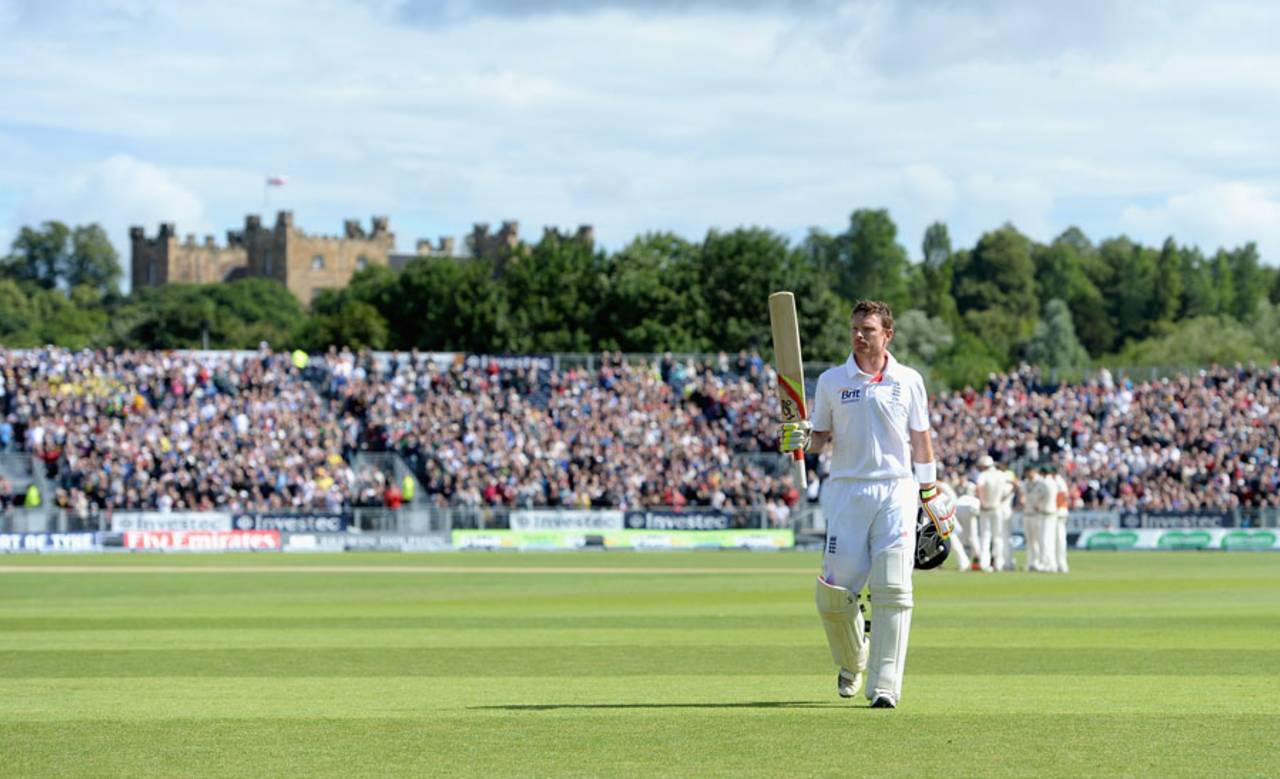The year of Bell
Ashes 2013 will be defined by his delicate late cuts, precision drives, and by the sheer weight of runs he produced
Dave Hawksworth
22-Aug-2013

Ian Bell: definitively excellent in a summer of underperformance • Getty Images
With the final Test at The Oval still to play itself out this might seem a bit premature, but I'm going to call it anyway: the 2013 Ashes has been no 2005. Okay, perhaps that's not a particularly big call to make. Because while the first match at Trent Bridge had a close finish, thanks to an Australian final-wicket stand reminiscent of the Edgbaston Test from eight years ago, and of course there have been other exciting passages of play and impressive individual performances, this just hasn't felt like a classic series.
That's partly because England winning the first two Tests pretty much guaranteed they would retain the urn before we had even reached the halfway point. But it has also been a difficult Ashes to define because there has been a lack of dominant players to define it for us. No Warne or Ponting to steamroll the English players into submission. No Botham or Flintoff to grab matches by the scruff of the neck and shake them until supporters tumble out of hospitality back into their seats. And precious few pyrotechnics from star players like Kevin Pietersen.
Instead much of the series has unfolded as we might have expected. Michael Clarke has led the way with the bat for Australia, but his 187 at Old Trafford aside, he hasn't been as fit as he was in England in 2009, when he managed to pull off heroics regularly. Chris Rogers has put in solid performances you would expect from a man with 15 years of experience and a first-class average of over 50.
The rest of Australia's batting, which was billed in the English media as a neurotic accident waiting to happen, has spent most of the summer being struck on the pads, mentally rolling a die before referring decisions to the third umpire, and in Shane Watson's case, moving up and down the order like a pre-teen playing in a shopping mall elevator.
Of the bowlers, James Pattinson managed just two Tests before succumbing to inevitable injury. Lyon has been solid if unspectacular, and Peter Siddle has done what Peter Siddle always does, run in with purpose, wearing the kind of facial expression you normally find on a cartoon butcher angrily chasing a dog out of his shop. The only surprise with Australia's attack has been that Ryan Harris has stayed fit throughout, which can only mean he's either Benjamin Button or that the team physio has made a blood sacrifice on the stroke of midnight at a Mississippi Delta crossroads.
Not that England can be entirely comfortable with their position. They entered the series unsure who their No. 6 should be, and crossed their fingers over whether they had picked the right man to partner Alastair Cook at the top of the order. Six weeks later they appear to be even more confused about a position in the side that has been an ongoing problem since Paul Collingwood retired two and a half years ago, with Joe Root, the only player to have looked secure at No. 6 in that time, now struggling against the new ball.
Cook, Trott, and Prior have endured a worse time with the bat than Bairstow, who was dropped, and the form of Finn and fitness of Bresnan have exposed just how reliant England are on their three main bowlers. If Australia had been able to somehow get their act together, the much-maligned side might well have managed to regain the Ashes. They may yet manage to do so in the return series this winter.
With so much underperformance by so many players, there's a danger that this could end up being known as the DRS Ashes - umpiring being the one theme that has linked the entire series. But while this summer's Ashes hasn't been a classic, it deserves more than to be remembered in the same light as West Indies' tour of New Zealand in 1979-80.
If these Ashes should be remembered for anything, perhaps it should be for the one player who has moulded them more than any other: Ian Bell.
Bell is a much under-appreciated player, one whose initial impression, forged back in that glorious 2005 Ashes series, was of a nervous young batsman tortured by the guile and sheer force of personality of Warne. It's an image that has endured for too long. Bell has long shown the technique, range of shots, and statistics to be regarded among the best batsmen in world cricket, yet he rarely seems to receive the recognition he deserves.
So in a series that has failed to live up to the heights set in the recent past, I shall remember Ashes 2013 for the one thing that has improved since 2005, the batting of Ian Bell. For me, this summer will be defined by his delicate late cuts, precision drives, and by the sheer weight of runs he produced that on numerous occasions have proved to be the difference between the two sides.
Dave Hawksworth has never sat in a press box or charged a match programme to expenses